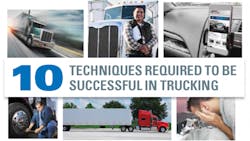Many trucking techniques are kept under wraps because of the solitary nature of the business—a trucker is provided with a truck, a set of keys, a product or item to haul, a place to load, and a location where he needs to deliver the load. All of this creates an atmosphere where sharing knowledge with others is limited. So, here’s a list of 10 ways that can help make the job simpler and more financially beneficial to the trucker, the shipper, the receiver, and the trucking company owner.
- Always have a plan. This includes the obvious route and time plan to pick up and deliver loads. You also need to include plans for maintaining your equipment, plans for staying healthy on the road, and plans to get the right amount of home time. And most important of all, you need a plan on how to reach your goals, both personal and business.
- Know what it costs to operate each piece of equipment on a daily, weekly, monthly and quarterly basis. You can’t control what you don’t know. Reducing unnecessary expenses is essential for any trucking operation.
- Develop a pay-yourself-first plan. This means including a salary as one of your fixed expenses, which helps you create a visual goal that you can achieve. If you wait for the leftovers on the financial side of your operation, you’ll end up with the crumbs. You need to help your lease operators do the same. Even your company drivers need to set daily and weekly income goals, because company drivers are usually paid by the mile.
- Schedule Preventive Maintenance. A truck or trailer with maintenance needs that are ignored will stop your forward progress at the most inopportune time. Making sure your equipment is in top-notch condition at all times means you can achieve your other goals. Ignore its maintenance and the truck will drive you to financial failure.
- Stay with it. In the current economic conditions, freight availability is going to be like riding a roller coaster. There will be times when you have plenty of freight for your trucks; there will be other times when you can’t seem to beg a load. The object is to minimize your no-load times. This is accomplished by developing specific freight lanes for each piece of equipment and planning as far into the future as possible.
- Communication. This is not just what is said or heard. Maintain a paper trail on all aspects of your trucking business. If it’s said and it’s important, write it down: who you talked with, when you talked with them, what was said by all parties, what was the final agreement, and if it’s extremely important, have everyone sign the document. Just because it’s spoken doesn’t mean it’ll be remembered. If circumstances change, whether it has to do with delivery or pickup times, repairs required on equipment, solutions to situations, or a personal dilemma, be sure it’s communicated to anyone with a need to know.
- Teamwork is multi-tiered when it comes to trucking. There’s the obvious team of driver, dispatch, maintenance department and safety, wherein teamwork can make everyone’s life more financially rewarding and less stressful, working to provide the best logistics service to the company’s customers. But don’t forget the other team members, the major reason you’re out there doing what you do: your family. Work with your spouse to develop your ‘Must Be At Home’ list and set family goals, which should be compatible with your trucking goals.
- Your shippers and receivers are king when it comes to Customer Service. Treating them as royalty is the first step to your success. To make sure your customers receive the best service, treat your drivers like you want your customers treated and you won’t have to worry about customer service. The best way to retain your customers is through the value of the highest quality service possible. Remember, value is determined more by quality of service than by price alone.
- Personal care means take care of yourself—in mind, body, and soul. Take the time to stop and smell the roses. Don’t allow yourself to become isolated from others by the sheer nature of your work. Be sure to exercise, even if it’s nothing more than a good brisk walk. Think twice, eat once; look at what you’re about to eat. Is it nourishing? Is it something that will cause you problems later? If the answer is ‘yes’ to the first question and ‘no’ to the second, enjoy it; if not, consider something else. Spend a few moments each day in spiritual contemplation to refresh your soul. Set an example for your employees and drivers.
- Recreation is needed, too. All work and no play makes for an irritable motor carrier owner and trucker. Schedule a hobby or activity that has nothing to do with trucking. This is your escape from your day-to-day responsibilities as a trucking company owner. Plan to do this at least once a week. Again, don’t forget to provide time and encouragement for your employees and drivers to do the same.
The most important skill required to be a successful trucker is good ol’ common sense. For a motor carrier owner, life goes by a load at a time. For a trucker, it goes by at 65 miles per hour. Don’t forget to engage the brake every so often to see what the rest of the world is up to.
You can learn a lot from watching how others are trucking. Some lessons will come from their successes, and others from their failures. And some will come from finding what no one else is doing that you can do to set yourself and your carrier apart from the ordinary carriers.
